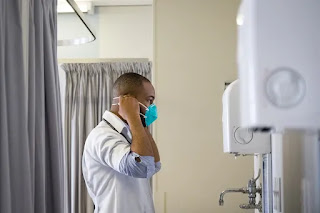 |
| Image: Nurse.org |
Now in some places, coronavirus cases are down, and in others, cases are up, and there's the sense that we're far from the "other side" of the COVID-19 pandemic. Businesses are reopening, others are having to re-close. Students who spent the latter half of spring term zoning out in front of Zoom classes are soon to return. My own students, who had to settle for seeing virtual patients--basically speech generating avatars--on screen, are keen to get back to seeing real patients with real problems.
And believe it or not, hospitals are keen to have them back! After all, our students represent their future success. I predict a lot of doctors and nurses are going to retire early, having put in their time in the trenches against the virus since February. I'm already starting to see this, and I wish them well. Having myself spent a bit of time in facilities seeing patients in PPE in this pandemic, I can understand that some folks have put in a lot of hard work and deserve a long rest.
On Facebook and elsewhere I see vituperative, sometimes nasty exchanges about the tension between coming out of our caves to carry on, and staying locked in until all danger has passed. I guess I shouldn't be surprised by the split, but I am a bit disappointed by how strongly (and often meanly) people on either side of this split are with each other. I kind of had to stop following Facebook.
Here are some of the issues working against staying locked in, and "safe."
- Young students are displaying abnormal adjustment behaviors and early mental health problems related to isolation from peers. They are falling behind in their learning in ways that may be difficult to remedy.
- Older persons, especially in nursing homes, are showing signs that the isolation is wearing them down. Their mental and physical health is deteriorating. I've seen this up close in my practice.
- I've seen people putting off getting health problems checked out, sometimes with tragic results, because they're afraid to go to hospitals and some doctors' offices are not yet open or only doing telehealth.
- My nursing students--and health care students elsewhere--want to see patients, learn their craft, and are often being told they cannot by colleges whose faculty fear getting sick, while the hospitals are desperate for new workers to replace those they'll lose.
- More and more people are becoming hungry and homeless due to prolonged shutdowns. The economic harm from our neglect to plan for such a pandemic will probably last for years.
- I see more and more people unwilling or unable to move themselves from a position of safe isolation to more engagement as they become swallowed up by their anxiety. What will happen to them, safe, but alone and isolated?
I don't have easy answers to these problems. On the one hand, we don't want people getting sick and maybe dying. On the other hand, how far can America decline without some things moving forward? We're kind of stuck.
I've talked to people who say they aren't coming out until there's a vaccine. But there's no certainty we'll ever have an effective vaccine, but if we get one, it's going to be a while. A year is optimistic, because even if one or more vaccines are developed, it will still take time to get it out to people. So here too, they're kind of stuck.
Contact tracing and selective quarantine of infected persons can help, but we have no national strategy for effecting such a plan. States and localities are basically on their own. Some of their plans are working, others, not so much. States open up, others shut down again. Stuck.
So maybe life in the COVID lane right now is just that: "stuck." Can't go forward. Can't go back.
I have been asked to come back this summer to teach clinical students in the hospital, because we have too many faculty who aren't willing to get back in there, because we all know there's COVID in there. I know it could walk into my office too, but I have kept seeing patients because sometimes "telehealth" just doesn't get the job done. You can't listen to someone's lungs on Zoom. You can't stitch up a wound on Skype. In that vein, I will be going into the classroom this fall as well. I can't teach someone else how to listen to someone's lung on Zoom either.
Maybe I'm being foolish. Maybe I should stay home.
But I look at it this way: If my work isn't important enough to risk my health and life for, then what is? Why am I even doing this?
Some people may lead lives that will never require such a thing of them, and that is comforting. That is not my life, and so I go into the breech.
Wish me luck!
No comments:
Post a Comment